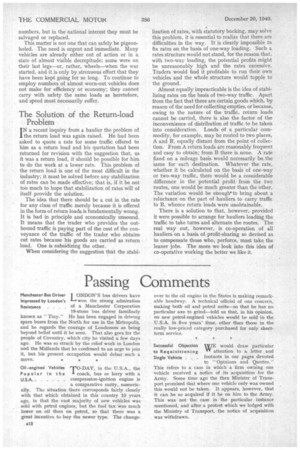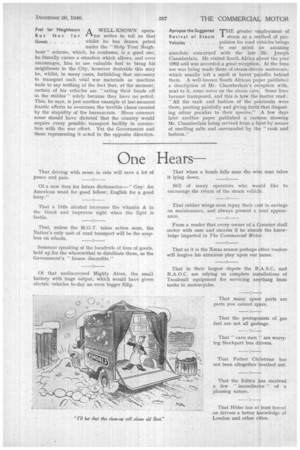Passing Comments
Page 14

Page 15

If you've noticed an error in this article please click here to report it so we can fix it.
Mandiester Bus Driver Impressed by London's Resistance . .
LONDON'S bus drivers have .1--+ won the strong admiration of a Manchester Corporation 19-stone bus driver familiarly known as "Tiny." He has been engaged in driving spare buses from the North for use in the Metropolis, and he regards the courage of Londoners as being beyond belief until it be seen. That also goes for the people of Coventry, which city he visited a few days ago. He was so struck by the relief work in London and the Midlands that he confessed to an urge to join it, but his present occupation would debar such a move.
Oil eng ned Vehicles TO-DAY, in the U.S.A., the Popular in the I coach, bus or lorry with a U S.A. compression-ignition engine is
a comparative rarity, numerically. The situation there corresponds fairly closely with that which obtained in this country 10 years ago, in that the vast majority of new vehicles was sold with petrol engines, but the fuel tax was much lower on oil than on petrol, so that there was a great incentive to buy the newer type. The change over to the oil engine in the States is making remarkable headway. A technical official of one concern, making both oil and petrol units—so that he has no particular axe to grind—told us that, in his opinion, no new petrol-engined vehicles would be sold in the U.S.A. in five years' time, other than those in the really low-priced category purchased for only shortterm service.
Successful Objection WE would draw particular to Requisitioning " attention to a letter and Single Vehicle . • footnote in our pages devoted to "Opinions and Queries." This refers to a case in which a firm owning one vehicle received a notice of its acquisition for the Army. Some time ago the then Minister of Transport promised that where one vehicle only was owned this would not be taken. It appears, however, that it can be so acquired if it be on hire to the Army. This was not the case in the particular instance mentioned, and after a protest which we lodged with the Ministry of Transport, the notice of acquisition was withdrawn.
Fuel for Neighbours A WELL-KNOWN opera
But Not for
r -I. tor writes to tell us that
Goods . whilst he has drawn petrol under the " Help Your Neighbour " scheme, which, he confesses, is a good one, he literally curses a situation which allows, and even encourages, him to use valuable fuel to bring his neighbours to the City, however desirable this may be, whilst, in many cases, forbidding that necessary to transport such vital war materials as machine tools to say nothing of the fact that, at the moment, certain of his vehicles‘ are " eating their heads off in the stables" solely because they have no petrol. This, he says, is just another example of last-moment frantic efforts to overcome the terrible chaos created by the stupidity of the bureaucrats. Sheer common sense should have dictated that the country would require every possible transport facility in connection with the war effort. Yet the Government and those representing it acted in the opposite direction.
Apropos the Suggested
Revival of Steam
Vehicles
THE greater employment of
steam as a method of propulsion for road vehicles brings
to our mind an amusing anecdote concerned with the late Mr. Joseph Chamberlain. He visited South Africa about the year 1902 and was accorded a great reception. At the time use was being made there of steam-driven motorcars, which usually left a smell oi burnt paraffin behind then. A well-known South African paper published a description of Mr. Chamberlain's reception with, next to it, some notes on the steam cars. Some lines became transposed, and this is how the matter read : "All the rank and fashion of the peninsula were there, panting painfully and giving forth that disgusting odour peculiar to their species." A few days later another paper published a cartoon showing Mr. Chamberlain being revived from a faint by means of smelling salts and surrounded by the "rank and fashion."




















































